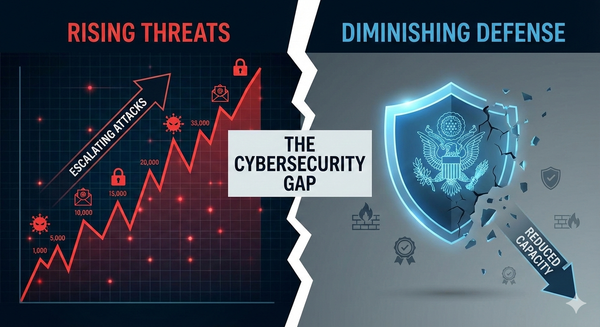This Week's Cybersecurity Wake-Up Calls: Chrome Zero-Days and Teenage Hackers

My thoughts on the most significant cyber developments this week.
Hi All, I hope you all of you guys are having a great day. Today, I will provide you with breaking news about three major cybersecurity incidents that unfolded this week and why they should fundamentally change how you think about protecting your business.
We saw Google patch its sixth Chrome zero-day of 2025, UK authorities arrest more teenage members of the notorious Scattered Spider group, and the ongoing fallout from the RaccoonO365 takedown. What connects these stories isn't just timing—it's what they reveal about where cybercrime is heading.
Google's Chrome Emergency: The Sixth Strike This Year
On Wednesday, Google released an emergency patch for Chrome to fix CVE-2025-10585, a zero-day vulnerability actively exploited in the wild. This marks the sixth actively exploited Chrome zero-day that Google has patched in 2025 alone.
Let me put this in perspective: When I started working in IT, we might see one or two zero-days per year across all major browsers. Now, Google is fixing six in Chrome alone before we've even finished the year. That's not just a trend—it's a red alert.
What Actually Happened
CVE-2025-10585 is a "type confusion" vulnerability in Chrome's V8 JavaScript engine. Think of it like this: imagine your brain suddenly couldn't tell the difference between your car and house keys. The V8 engine got similarly confused about different data types, and attackers exploited this confusion to run malicious code on victims' computers.
The scariest part? This attack requires zero user interaction beyond visiting a compromised website. No clicking on suspicious links, no downloading files—just load a webpage and you could be compromised.
Google's Threat Analysis Group discovered this vulnerability, which tells me something important: this wasn't some random criminal finding a bug. TAG focuses on nation-state actors and commercial spyware vendors—the sophisticated players who target high-value individuals like politicians, dissidents, and journalists.
But here's what really concerns me: if the professionals are burning through six Chrome zero-days in less than nine months, what does that say about browser security? More importantly, how many zero-days are out there that we haven't found yet?
What You Need to Do Right Now
- Update Chrome immediately—go to Settings > About Google Chrome and let it update, then restart
- Enable automatic updates if you haven't already
- Consider using multiple browsers for different activities (banking vs. general browsing)
- Review your endpoint security—browser exploits often lead to deeper system compromise
Scattered Spider Strikes Again: When Teenagers Run Cybercrime Empires
This week also brought news that should terrify every business owner: UK authorities arrested two more members of Scattered Spider, including 19-year-old Thalha Jubair, who's accused of involvement in at least 120 cyberattacks.
Let me repeat that: 120 attacks. This teenager allegedly participated in more successful cyberattacks than most professional hacking groups accomplish in their entire existence.
The Scale is Staggering
Jubair and 18-year-old Owen Flowers were charged with the August 2024 cyberattack on Transport for London that caused "significant disruption and millions in losses." But that's just the tip of the iceberg.
According to court documents, Jubair is also accused of:
- Hacking into the US federal court system to search for information about Scattered Spider investigations
- Using compromised court accounts to submit fake emergency requests for user data from financial companies
- Targeting multiple US healthcare organizations
The financial impact is mind-boggling. Scattered Spider has been linked to over $115 million in ransom payments, and they're just getting started.
Why This Changes Everything
In my early career, cybercriminals were typically older, technically sophisticated individuals working in organized groups. Scattered Spider flips that model completely:
- They're kids: Most members are teenagers or young adults.
- They're distributed: Operating across the US, UK, and other English-speaking countries.
- They're social engineers: Instead of finding complex technical vulnerabilities, they simply call your help desk and trick your employees.
The group has perfected what I call "confidence hacking"—they research your employees on LinkedIn, contact your IT support pretending to be that employee, and walk away with full network access. No sophisticated malware is required; just sound old-fashioned manipulation.
The Healthcare Targeting Problem
What particularly concerns me is Scattered Spider's systematic targeting of healthcare organizations. Flowers was explicitly charged with conspiring to infiltrate SSM Health Care Corporation and Sutter Health.
Healthcare cybersecurity is already stretched thin, with outdated systems, budget constraints, and life-safety priorities that make security updates challenging. When teenagers can successfully breach major healthcare networks, it tells you something fundamental is broken in our approach to protecting critical infrastructure.
The Bigger Picture: Where Cybercrime is Headed
Looking at this week's events together, I see three troubling trends:
1. The Professionalization of Amateur Cybercrime Scattered Spider represents a new model where young, English-speaking hackers use simple social engineering to achieve what used to require years of technical expertise. The barriers to entry for cybercrime have essentially disappeared.
2. The Weaponization of Everyday Technology Chrome zero-days and social engineering attacks exploit tools we use daily—our browsers and our natural tendency to trust and help others. The attack surface isn't just technical anymore; it's human.
3. The Scale Problem When a single teenager can be involved in 120 attacks, and we're seeing six browser zero-days in one year, we're not dealing with isolated incidents. We're seeing industrial-scale cybercrime that our current defenses weren't designed to handle.
What This Means for Your Business
Immediate Actions (This Week)
- Update all browsers and enable automatic updates
- Test your help desk procedures with social engineering simulations
- Review access controls for privileged accounts
- Implement multi-factor authentication everywhere
Strategic Changes (Next 30 Days)
- Develop incident response plans specifically for social engineering attacks
- Create verification procedures for IT support requests
- Consider a zero-trust architecture for critical systems
- Evaluate your cybersecurity insurance coverage
Long-term Investment (Next 90 Days)
- Implement comprehensive security awareness training.
- Deploy advanced threat detection and response capabilities.
- Establish relationships with cybersecurity professionals.
- Create board-level reporting on cybersecurity risks.
My Prediction: It Gets Worse Before It Gets Better
Based on what I'm seeing, I expect 2025 to be a watershed year for cybersecurity. Combining AI-powered attacks, teenage hacker groups, and endless zero-days creates a perfect storm.
The old model of perimeter defense and signature-based detection is dead. Organizations must assume they'll be breached, focus on limiting damage, and recover quickly.
But here's the thing: while the threats are getting more sophisticated, the fundamentals of good cybersecurity haven't changed. Multi-factor authentication, employee training, regular updates, and incident response planning still work. They just need to be implemented more comprehensively and maintained more vigilantly than ever before.
The Bottom Line
This week reminded me why I became interested in cybersecurity in the first place: to help people or organizations protect themselves against evolving threats. The bad news is that those threats are growing faster than ever. The good news is that with the right approach, they're still manageable.
Don't let stories about teenage hackers and browser zero-days paralyze you with fear. Let them motivate you to take action. Because in cybersecurity, the only absolute failure is doing nothing.



